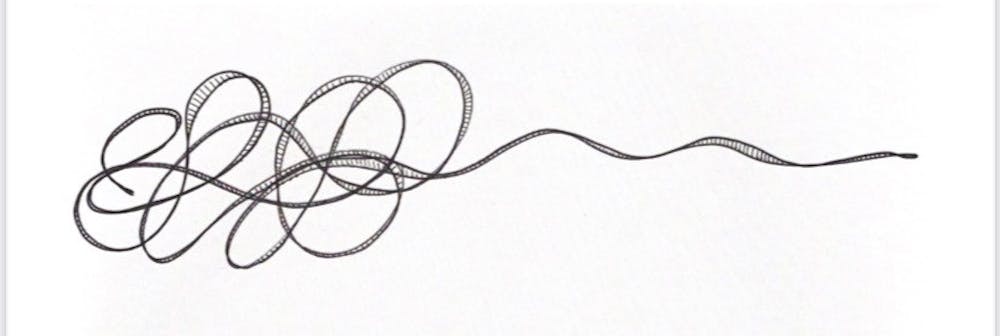Six years ago, I wouldn’t have been able to get out of bed. Six years ago, it would have taken me three hours to get ready for school. Six years ago, I would have been tapping and stomping and counting in order to get out of the car, eat a meal or walk to the bathroom. Six years ago, I never thought I would be where I am today: a student and an athlete at Middlebury College.
October is National Obsessive-Compulsive Disorder (OCD) Awareness month, and I share my story now with the hope of raising consciousness about OCD in the Middlebury community. My experience is not unique, but I look to restore a sense of hope in others and help them untangle themselves from the chains of overwhelming fears and anxieties.
I have struggled with severe anxiety and obsessive-compulsive disorder for most of my life. But six years ago — when I was 12 — this condition reached its peak. Rooted in the fear of becoming sick, my OCD took hold of me until I was immobilized and could no longer function as a human being, let alone do the things I enjoyed the most, like swimming and spending time with my younger sister.
My anxiety-ridden obsessions were so overbearing that I was unable to complete basic tasks such as eating, sleeping, engaging in personal hygiene or walking. Stuck in a place of depressive, dark anxiety coupled with an ever-spinning wheel of compulsory behavior, I was hopeless. As my behavioral compulsions became increasingly intense and overpowering, I was eventually forced to take a leave of absence from school.
It became apparent to me and my family that an intervention was needed in order to help me get back on track. Living in a very rural community exacerbated the difficulties of finding adequate mental health services, particularly for the intensive treatment I needed. Beginning in the spring of 2014, I enrolled in an intensive outpatient program in the Bay Area, specifically designed for adolescents struggling with severe obsessive-compulsive disorder and other anxiety-related mental illnesses. I was lucky enough to have the support from my family that allowed me to temporarily move closer to the treatment center to complete a 10-week intensive program that focused on exposure response prevention therapy, commonly known as ERP. While the end result was utterly life changing, those moments in treatment were some of the most difficult days of my life.
My therapy consisted of progressively working through behavioral changes to disassociate fear and obsessive triggers from continual behavioral rituals, or compulsions. Every day posed a new challenge, and every day I found myself getting a little bit stronger. Over time, reversing and erasing rituals became easier and easier, and I was beginning to find myself again without the angry mask of the disorder which had haunted me for so long.
At the end of treatment, I was able to walk, eat, sleep, study and go about my day without the overbearing stress of my compulsions. I was able to swim, return to school and spend time with friends once again. Most importantly though, I was able to smile and laugh and feel something besides fear. I was happy.
Six years later, I am still that same girl. Even though the severity of my OCD has never returned to the levels it once peaked at, I still struggle. While getting sick may not be a large fear of mine anymore, circumstance lends itself to the power of the mind. In recent years I have struggled with an eating disorder, and while there are rougher and easier patches, my anxiety is still very much a part of who I am. The difference now, however, is that I have been to that incredibly dark place. I know what it’s like to wish everything would just stop so that there could finally be some peace. And I know what it is like to lose yourself.
I have come to accept that I will never completely overcome the obsessive-compulsive disorder, but I have learned what it means to be a fighter and overcome fear. I have the tools now to help me challenge intrusive thoughts and heightened anxiety. ERP was the most effective strategy, and I still rely on the cognitive tools that my therapists helped me develop when I was in the intensive program. I continue to use practices of mindfulness and visualization, which I incorporate into my life through activities such as yoga, journaling and meditation. Honest, open communication is paramount to success. I am forever thankful for the relationship I have with my family as well as the therapists and clinicians who have provided a space for my voice and responded with love and validation throughout the years.
I used to feel ashamed of my OCD, like it was some tremendous secret I needed to protect. I have come to realize that I am not defined by a diagnosis, nor am I guilty about who I am. My struggles have made me into the woman I am today. Confronting OCD at a young age forced me to mature quickly, giving me the opportunity to appreciate the nuances of life so much more. I have learned to harness the strength to overcome whatever life decides to throw, and I believe, with every part of me, that you can too.
Haley Hutchinson is a member of the class of 2023.
Living with severe obsessive-compulsive disorder

Comments


